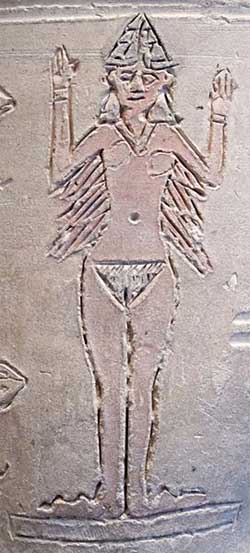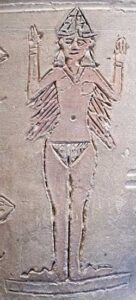
Ishtar/Inana is the sister of Ereshkigal, who rules the dead. In Babylonian tradition, Ishtar, the daughter of Sin and sister of Shamash, was a fertility and storm goddess as well as goddess of love, marriage, spring, and the hunt. She was often invoked for protection from evil and illness. She was said to have taken on many lovers, which she would then kill when finished with them.
At Uruk, Ishtar, as the daughter of Anu, the sky god, and the goddess, Anat, was worshiped as the goddess of love and desire. At Nineveh and Erbil, she was worshiped as a warrior, having once ripped out the teeth of a lion.
The Sumerian Descent Myth
There is great animosity between the Inanna and Ereshkigal, and the Descent of Inanna/Ishtar tells of how Ishtar/Inanna descended to the underworld. In the Sumerian version of the myth, dated around 1900-1600 BCE, Inanna descended to the underworld using the Eastern entrance in attempt to obtain Ereshkigal’s power over the underworld. In order to reach Ereshkigal, Inanna needed to pass through the seven gates of the underworld, and was not allowed to pass through unless she removed an article of clothing for each of gate. Her clothes were symbolic of her divine power, thus she was systematically weakened in this fashion. By the time she arrived in the inner palace, she was naked and almost dead, but still determined to complete her task, when Ereshkigal arose from her throne, Inanna took it. Ereshkigal’s counselors, the Anunnaki, sentenced her to death for this action & hung her corpse on a hook.
However, before Inanna had begun her journey, she had instructed her messenger, Ninshubur, that if she did not return within 3 days and 3 nights, to seek help for that would mean she was dead. Ninshubar first sought help with the gods, Enlil and Nanna, but they refused to aid her believing she deserved to die for her ambition. He then asked Enki, the lord of wisdom who had access to the food and water of life, for aid. Enki created 2 creatures, the kurgarru and the kalaturru, from the dirt of his fingernails & instructed them to carry the food and water of life to Inanna in order to revive her. Their mission suceeded, but the Anunnaki demanded a substitute for her if she was to leave. A legion of demons accompanied her from the netherworld to search for her replacement. Inanna refused to allow the demons to take anyone who had wept for her during her confinement as a replacement.
When Inanna came upon her husband, Dumuzi, she found him adorned in a magnificent robe instead of mourning clothing. She told the demons to take him as her substitute. Dumuzi quickly used his magic to change himself into a reptile, & escaped to his sister, Gestinanna. She took pity on him & agreed to take his position in the underworld for half the year, while he would spend the other half the year in the underworld.
The Akkadian Descent Myth
The Akkadian version of the myth dates to around 1100 BCE, and substitutes the name, Ishtar, for Inanna. Ishtar descended to the underworld & threatened her way inside. In accordance with the customs of Ereshkigal, however, for every one of the seven gates she passed under, a guardian removed a portion of her attire. When she reached Ereshkigal, she was nearly dead. simultaneously, on the earth, a great famine struck, & no life force could reproduce. The god Ea sent a eunuch to make a bargain with Ereshkigal: clean water for the release of Ishtar. She cursed the eunuch, consulted with the Anunnaki, & then ordered the release of Ishtar, who was given back her possessions as she passed through the seven gates & out of the underworld. However, for Ishtar’s release, Ereshkigal demanded a replacement.
Inana & Ebih
One hymn praises Innana for her destructive capabilities as she prepares and then defeats the mountain, Ebih, who refused to honor her. When she seeks instruction from An, the king of the deities, he warns her not to continue in her quest. Innana, however, ignores his advice & wages a huge battle against Ebih, summoning a great storm and then seizing Ebih & drives a dagger into him, thus emerging the victor.
“Goddess of the fearsome divine powers, clad in terror, riding on the great divine powers, Inana, made complete by the strength of the holy ankar weapon, drenched in blood, rushing around in great battles, with shield resting on the ground (?), covered in storm and flood, great lady Inana, knowing well how to plan conflicts, you destroy mighty lands with arrow and strength and overpower lands.
In heaven and on earth you roar like a lion and devastate the people. Like a huge wild bull you triumph over lands which are hostile. Like a fearsome lion you pacify the insubordinate and unsubmissive with your gall.” – Inana and Ebih: translation 1-9
Inana’s Rape
In another myth, after Innana had gone into the mountains to learn the source of falsehood and justice and had travelled through many lands, she became tired and fell asleep underneath a tree. Noticing her, Cu-kale-tuda went over to her and had intercourse with her as she slept. When she awoke & realized what had happened:
“Then the woman was considering what should be destroyed because of her genitals; Inana was considering what should be done because of her genitals. She filled the wells of the Land with blood, so it was blood that the irrigated orchards of the Land yielded, it was blood that the slave who went to collect firewood drank, it was blood that the slavegirl who went out to draw water drew, and it was blood that the black-headed people drank. No one knew when this would end. She said: “I will search everywhere for the man who had intercourse with me”. But nowhere in all the lands could she find the man who had had intercourse with her. – Now, what did one say to another? What further did one add to the other in detail?” – Inana and Shu-kale-tuda: translation 129-138
Her search was in vain, for she couldn’t find Cu-kale-tuda. Again she pondered what she should do:
Then the woman was considering a second time what should be destroyed because of her genitals; Inana was considering what should be done because of her genitals. She mounted on a cloud, took (?) her seat there and ……. The south wind and a fearsome storm flood went before her. The pilipili (one of the cultic personnel in Inana’s entourage) and a dust storm followed her. Abba-cucu, Inim-kur-dugdug, …… adviser ……. Seven times seven helpers (?) stood beside her in the high desert. She said: “I will search everywhere for the man who had intercourse with me”. But nowhere could she find the man who had intercourse with her. – Inana and Shu-kale-tuda: translation 185-193
Still, Innana was not able to find Cu-kale-tuda. Next:
Then the woman was considering a third time what should be destroyed because of her genitals; Inana was considering what should be done because of her genitals. She took a single …… in her hand. She blocked the highways of the Land with it. Because of her, the black-headed people ……. She said: “I will search everywhere for the man who had intercourse with me”. But nowhere could she find the man who had intercourse with her. – Inana and Shu-kale-tuda: translation214-220
Finally, she entered her father, Enki’s shrine and with his help, found Cu-kale-tuda and confessed. When Innana heard this, she sentenced him to death.
When he had spoken thus to her, …… hit ……. …… added (?) ……. …… changed (?) him ……. She (?) determined his destiny ……, holy Inana spoke to Cu-kale-tuda: “So! You shall die! What is that to me? Your name, however, shall not be forgotten. Your name shall exist in songs and make the songs sweet. A young singer shall perform them most pleasingly in the king’s palace. A shepherd shall sing them sweetly as he tumbles his butter-churn. A young shepherd shall carry your name to where he grazes the sheep. The palace of the desert shall be your home. – Inana and Shu-kale-tuda: translation 290-310
Ishtar’s Attempt to Seduce Gilgamesh
In the Epic of Gilgamesh, Ishtar attempted to seduce Gilgamesh. Gilgamesh refused her advances, and listed several of her previous lovers:
“For Dumuzi the lover of your youth
You decreed that he should keep weeping year after year.
You loved the colourful allallu-bird,
But you hit him and broke his wing.
He stays in the words crying ‘My wings!’
You loved the lion, whose strength is complete,
But you dug seven and seven pits for him.
You loved the horse, so trustworthy in battle,
But you decreed the whip, goad, and lash for him
You decreed that he should gallop seven leagues (nonstop),
You decreed that he should be overwrought and thirsty,
You decreed endless weeping for his mother Sililu.
You loved the shepherd, herdsman, and chief shepherd
Who was always heaping up the glowing ashes for you,
And cooked ewe-lambs for you every day.
But you hit him and turned him into a wolf,
His own herd-boys hunt him down
And his dogs tear at his haunches.
You loved Ishullanu, your father’s gardener,
Who was always bringing you baskets of dates.
They brightened your table every day;
You lifted your eyes to him and went to him
‘My own Ishullanu, let us enjoy this strength,
So put out your hand and touch our vulva!’
But Ishullanu said to you,
‘Me? What do you want of me?
Did my mother not bake for me, and did I not eat?
What I eat (with you) would be loaves of dishonour and disgrace,
Rushes would be my only covering against the cold.’
You listened as he said this,
And you hit him, turned him into a frog (?),
Left him to stay amid the fruits of his labor.”
– tablet VI, SBV ii
Ishtar was furious at Gilgamesh’s rejection and so she went to her father, Anu, and requested the Bull of Heaven to attack Gilgamesh. Anu refused at first but eventually gave in to her pleadings. Enkidu and Gilgamesh were able to slay the bull, but as punishment, Enkidu was plagued by illness and soon died.











 Belphegor
Belphegor